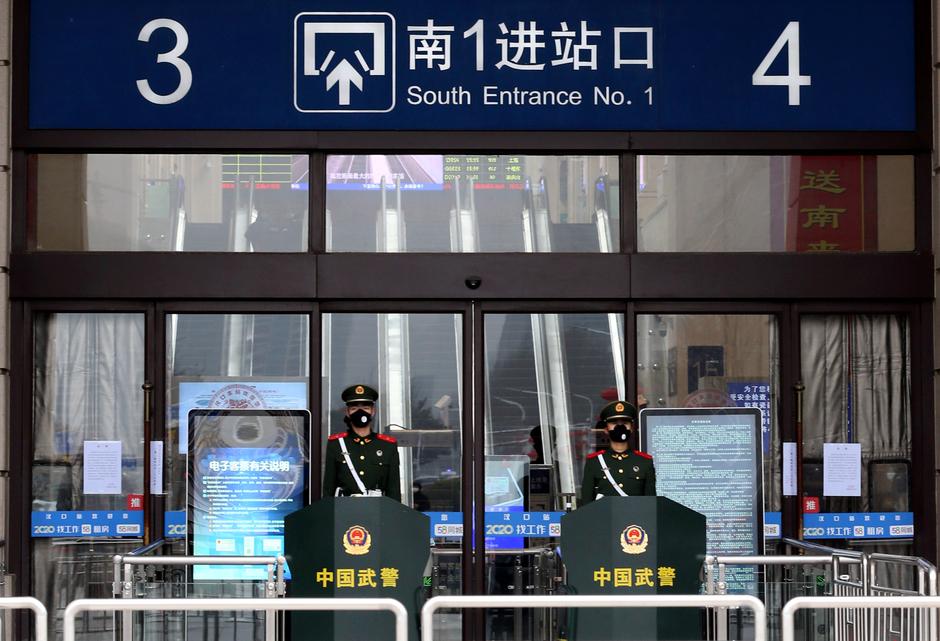‘Animal Contagion Most Likely Explanation For Covid Genesis’

FILE PHOTO: Chinese paramilitary officers wearing masks stand guard at an entrance of the closed Hankou Railway Station after the city was locked down following the outbreak of the coronavirus in Wuhan, Hubei province, China
Early Covid-19 cases traced to markets in Wuhan, China, mirror the initial spread of SARS 17 years earlier, scientists said in a paper that concludes that an animal contagion is the most likely explanation for the pandemic’s genesis.
The epidemiological history of SARS-CoV-2 is comparable to previous animal market-associated outbreaks of coronaviruses and offers a simple route for human exposure, Edward Holmes, Andrew Rambaut and 19 other researchers said on Wednesday in a review of the scientific evidence pertaining to the pandemic’s origins.
The paper was released on Wednesday ahead of peer-review, and is being prepared for submission to a journal for publication, one of the authors said. It gives a detailed explanation for SARS-CoV-2’s genetic signatures, early epidemiology and research undertaken at the Wuhan Institute of Virology.
Debate about Covid’s emergence has coalesced around two competing ideas: a laboratory escape or a spillover from animals. The authors, who also include Nobel Prize winner Peter Doherty and Wellcome Trust Director Jeremy Farrar, said there is no evidence that SARS-CoV-2 has a laboratory origin, and the suspicion stems from the coincidence that the pandemic virus was first detected in a city that houses the institute’s maximum bio-safety lab that studies coronaviruses and deadly diseases, such as Ebola.
The lab accident theory “cannot be entirely dismissed,” but it’s very unlikely, the authors said, compared with “the numerous and repeated human-animal contacts that occur routinely in the wildlife trade.”
‘COLLISION COURSE’
Failure to investigate and understand the contagion’s viral origin through collaborative and carefully coordinated studies “would leave the world vulnerable to future pandemics arising from the same human activities that have repeatedly put us on a collision course with novel viruses,” they wrote.
Wuhan is the largest city in central China with multiple animal markets and is a major hub for travel and commerce, well connected to other areas both within China and internationally, the authors said. The link to Wuhan, therefore, more likely reflects the fact that pathogens often require heavily populated areas to become established.
Based on epidemiological data, the Huanan wholesale seafood and produce market in Wuhan was an early epicenter of SARS-CoV-2 infections, the researcher said. Two of the three earliest documented Covid-19 cases were directly linked to the market that sold live, wild animals, as were 28% of all cases reported in December 2019. Overall, 55% of cases during that month had an exposure to either the Huanan or another market in Wuhan, with these cases more prevalent in the first half of that month.
Although no bat reservoir nor intermediate animal host for SARS-CoV-2 has been found so far, the virus’s transmission from one animal species to another is likely to go undetected, the authors said. Initial SARS-CoV-2 cases aren’t likely to have spread the virus to other people, and only a small subset of spillover events from animals to humans results in major outbreaks.
The pandemic virus evolved in a host environment “highly similar, if not identical,” to a bat coronavirus that’s considered the closest match to SARS-CoV-2, researchers at Sun Yat-Sen University and Guangzhou University said. Their research, released on July 1 on a pre-print server, found it would be difficult to duplicate SARS-CoV-2 in cell culture under laboratory conditions.





